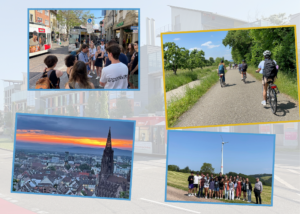Program Highlights
Program Dates
June 24 – July 13, 2024
Faculty Director
Adam Lovelady, Professor fo Public Law & Government, School of Government
As a faculty member at the UNC School of Government, Adam Lovelady teaches, researches, and advises on city planning, land use law, and sustainable development. Lovelady was named Albert and Gladys Hall Coates Term Professor for Teaching Excellence for 2019–2021, and he was named Coates Distinguished Term Assistant Professor for 2015–2017. Lovelady co-led a Burch Field Research Seminar in Summer 2023.
Program Highlights
This course will examine sustainable transportation, urban planning, and renewable energy in European cities. With Copenhagen, Hamburg, and Freiburg as models, students will have first-hand experiences of the sustainable development transition in leading European communities. Students will bike through world-class bicycle infrastructures, tour net zero urban developments, and see solar, wind, and district energy systems up-close. Discussions and class assignments will explore urban planning themes, investigate energy policy, and highlight the American and European legal and policy frameworks.
Copenhagen, Denmark, is a model green city. With its leading bicycle infrastructure and high rates of cycling, Copenhagen is recognized as one of the most bike-friendly cities in the world. Investments in offshore wind, rooftop solar, and district heating make Copenhagen a leader in the energy transition. And people-focused city planning has led to pedestrian streets, swimmable rivers, and striking architecture. The city aims to be carbon neutral by 2025.
Hamburg, Germany’s second largest city, is a leading city for sustainable development. This major port city is home to the HafenCity, Europe’s largest inner-city urban development area which aims to serve as a blueprint for the new European city on the waterfront. In 2021, the European Centre for Architecture Art Design and Urban Studies named Hamburg the Green City of the Year.
Freiburg, Germany, situated above Switzerland in Southern Germany, is considered a model for sustainability and renewable energy around the world. Freiburg and the surrounding region is the birthplace of the German Energiewende. It was home to the first solar expo, and it houses the Fraunhofer Institute for Solar Technologies (ISE).



